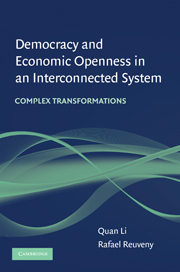Book contents
- Frontmatter
- Contents
- List of Figures and Tables
- Acknowledgments
- 1 Introduction
- PART I THE DEMOCRACY–ECONOMY NEXUS
- PART II BRINGING IN CONFLICT
- PART III BRINGING IN THE ENVIRONMENT
- 7 Democracy and the Environment
- 8 Economic Openness and the Environment
- 9 Conflict and the Environment
- 10 Conclusion
- References
- Author Index
- Subject Index
9 - Conflict and the Environment
Published online by Cambridge University Press: 05 June 2012
- Frontmatter
- Contents
- List of Figures and Tables
- Acknowledgments
- 1 Introduction
- PART I THE DEMOCRACY–ECONOMY NEXUS
- PART II BRINGING IN CONFLICT
- PART III BRINGING IN THE ENVIRONMENT
- 7 Democracy and the Environment
- 8 Economic Openness and the Environment
- 9 Conflict and the Environment
- 10 Conclusion
- References
- Author Index
- Subject Index
Summary
INTRODUCTION
This chapter studies the effects of war on the environment in an innovative way and as part of the story told in this book. Thus far we have studied the effects of economic openness and democracy on conflict, inequality, development, and the environment, and how these forces interact. The concern of analysts and policy makers is growing, including those in the Pentagon, that the environment will play a role in conflict as climate change progresses. The effect of conflict on the environment, in the context of globalization, thus becomes an important complex transformation to study.
The Intergovernmental Panel on Climate Change (IPCC) expects that climate change will intensify during this century, causing growing environmental degradation (IPCC, 2007a, 2007b). Consequently, we may see more wars as countries vie for degraded resources or quarrel over who should cover the costs of ameliorating or reducing environmental damages. Although the link from climate change to war is still only a possibility, many scholars have observed that environmental forces have already caused conflicts. In contrast, the effect of war on the environment has received little scholarly attention. Part of the reason for this neglect is perhaps the temptation to assume that wars always destroy the environment. One may recall the pollution caused by burning oil wells during the 1991 Gulf War or the destruction of forests during the Vietnam War. We argue that it is not the only possibility; war may benefit the environment, albeit perversely, by disrupting environmentally harmful economic activities.
- Type
- Chapter
- Information
- Democracy and Economic Openness in an Interconnected SystemComplex transformations, pp. 266 - 291Publisher: Cambridge University PressPrint publication year: 2009

